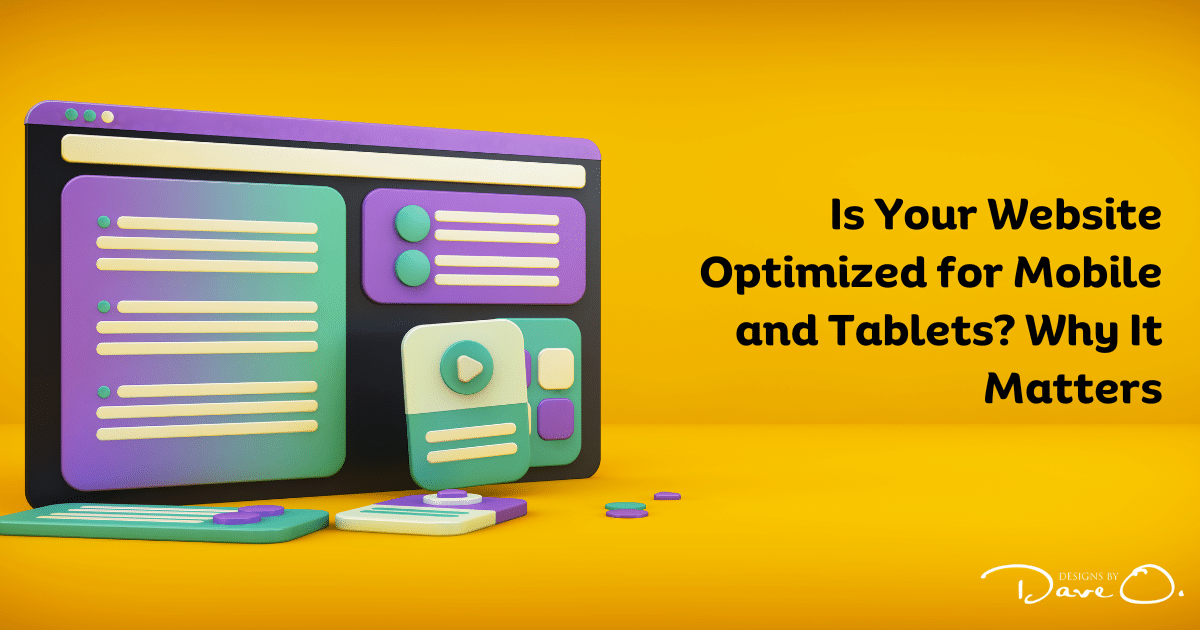In today’s digital age, having a strong online presence is essential for any business or organization. With the increasing use of smartphones and tablets, having a website that is optimized for mobile and tablets is crucial.
Not only does it enhance the user experience, but it also has a significant impact on your website’s visibility and search engine rankings. As more and more users access the internet through their mobile devices, it has become imperative for websites to adapt and be compatible with these devices.
Is Your Website Optimized for Mobile and Tablets?
In this article, we will discuss the importance of having a mobile and tablet-optimized website and how it can benefit your business. We will delve into the various elements that make a website mobile-friendly and why it matters for your brand’s online success.
Whether you are a small business owner or a large corporation, understanding the significance of a responsive and user-friendly website is vital in today’s competitive digital landscape.
So, let’s explore why having a mobile and tablet-optimized website matters and how you can ensure your website meets the standards of today’s evolving technological landscape.
Mobile optimization boosts user experience
Ensuring that your website is optimized for mobile and tablets is no longer an option but a necessity. With the widespread use of smartphones and tablets, more and more people are accessing the internet through these devices.
This means that if your website is not optimized for mobile, you could potentially be losing out on a large portion of your target audience. By optimizing your website for mobile and tablets, you are providing a seamless and user-friendly experience for your visitors, making it easier for them to navigate and interact with your site.
This ultimately leads to increased customer satisfaction and the likelihood of them returning to your site in the future.

Responsive design enhances mobile accessibility
One key benefit of responsive design is its ability to enhance mobile accessibility. With the rise of smartphones and tablets as primary devices for internet browsing, websites must be optimized for these platforms.
Responsive website design allows websites to adapt to different screen sizes and orientations, making them accessible and user-friendly on a variety of devices.
This eliminates the need for separate mobile and desktop versions of a website, streamlining the user experience and improving accessibility for all users.
Mobile-friendly sites rank higher in search
In today’s digital age, having a mobile-friendly website is essential for any business looking to improve its online presence.
This is because search engines prioritize and rank mobile-friendly sites higher in their search results. This means that having a responsive design that caters to mobile and tablet users can greatly impact your website’s visibility and traffic.
Additionally, a mobile-friendly site can improve the overall user experience, making it easier for visitors to navigate and engage with your content.
This not only benefits your website’s search engine ranking but also has the potential to increase conversions and, ultimately, your business’s success. So, if your website is not yet optimized for mobile and tablets, it’s time to prioritize this crucial aspect of web design.
Mobile optimization increases conversion rates
In addition to improving search engine rankings and user experience, mobile optimization can greatly impact conversion rates for businesses.
With the majority of internet users now accessing websites on their mobile devices, businesses need to have a website that is optimized for mobile and tablets.
This means having a website that is easily navigable, loads quickly, and provides a seamless experience for users on various screen sizes. By catering to the needs of mobile users, businesses can increase their chances of converting website visitors into paying customers.
Mobile optimization future-proofs your website
As technology continues to advance and the use of mobile devices becomes even more prevalent, it is essential for businesses to future-proof their websites by optimizing them for mobile and tablets.
This means designing and developing websites with a responsive website design that adapts to different screen sizes and devices. By doing so, businesses can ensure that their website will remain relevant and accessible to users, regardless of the device they are using.
In today’s fast-paced and ever-changing digital landscape, adapting to the needs and preferences of mobile users is crucial for the long-term success and sustainability of any business.

FAQ
How does having a mobile and tablet-optimized website impact user experience?
Having a mobile and tablet-optimized website significantly improves user experience by providing a seamless and user-friendly interface that adapts to smaller screens and touch-based navigation.
Optimized websites load faster, have responsive layouts, and easily accessible content. This results in improved readability, easy navigation, and reduced user frustration. With a mobile and tablet-optimized website, users can access information quickly and efficiently, increasing engagement and satisfaction.
How do I check if my website is mobile and tablet-optimized?
To check if your website is mobile and tablet-optimized, you can use various methods. One way is to manually access your website from a mobile device or tablet to see how it appears and functions.
What are the SEO benefits of mobile and tablet optimization?
Optimizing for mobile and tablets has several SEO benefits. Firstly, it improves the user experience by providing a mobile-friendly design, making it easier for users to navigate and engage with your site.
This leads to lower bounce rates and higher time on site, which are positive ranking factors for search engines.
Secondly, mobile optimization increases the likelihood of your site ranking higher in mobile search results, as search engines prioritize mobile-friendly sites.
Lastly, with the increasing use of mobile devices for search, having a mobile-optimized site helps you reach a larger audience and increase organic traffic to your site.
Is a responsive design the best approach for mobile and tablet optimization?
Yes, a responsive design is generally considered the best approach for mobile and tablet optimization.
A responsive design allows the website to adapt and adjust its layout, content, and functionality based on the device it is being viewed on. This ensures a consistent user experience across different screen sizes and resolutions.
Responsive design also simplifies maintenance and updates, as there is only one version of the website to manage.
Do I need a separate mobile website in addition to my desktop site?
Yes, having a separate mobile website is highly recommended. With the increasing number of mobile users, having a mobile-friendly website is crucial for providing a positive user experience.
A separate mobile website allows for optimized content and layout specifically designed for mobile devices, ensuring that your website is easy to navigate and visually appealing on smartphones and tablets.
It also enhances loading speed, improves search engine rankings, and increases the chances of converting mobile visitors into customers. Overall, investing in a separate mobile website can greatly benefit your business in today’s mobile-driven world.







